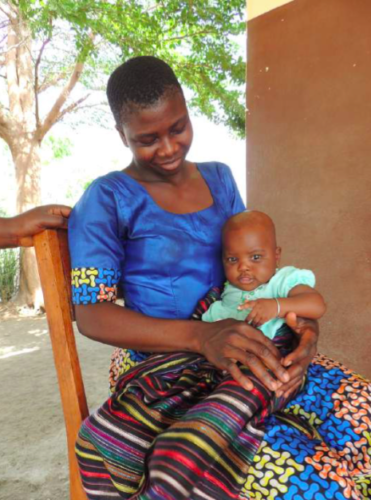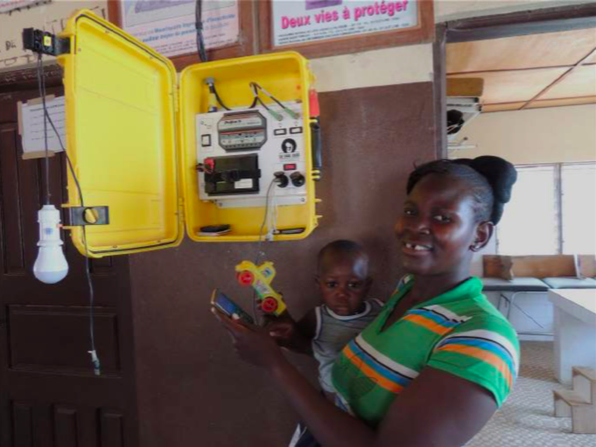Imagine you live in a rural village in Northern Togo, you are 9 months pregnant and when you feel the contractions of labor you travel on a motorcycle along the dirt road to the local health clinic to deliver. But it is after 7 pm and on this latitude it means that the sun has long gone down. The clinic has no electricity and it is pitch dark. So you have to deliver your baby in the darkness while the birth attendant is holding a flashlight between her cheek and shoulder while she helps your baby into the world. Until recently this was a common scenario for patients and staff at the primary health care facility in the village of Kpindi in Northern Togo. But in May 2016, We Care Solar together with Hope Through Health, who works to provides free, quality healthcare for pregnant women and children under five in remote communities of Togo, installed a Solar Suitcase. The suitcase connects solar panels to two LED lights in the consultation room and the delivery room. Mounira Bodi – a birth attendant – has worked in the Kpindi clinic since 2011. She remembers how it was before the Solar Suitcase was installed:
“Before, if there was a delivery at night you would have to hold a torch while working – or the person accompanying the woman would hold it. During consultations it could be difficult to see what you were doing; for example, finding a vein in the dark for giving IV – that is not easy! But now, it easier to consult patients, even at night” Though the conditions have improved, there are still dim places in the clinic: “Now we can work well in the consultation and delivery room, but there is still no light in the observation and hospitalization room,” says Mounira Bodi.
Also patients are happier to go to the to the clinic now if they are sick or have to deliver:
“When it was dark – what could they do? Take a torch and concentrate on holding that instead of working. Now there is light and they can work. And as a woman giving birth you are more at ease because there is light,” tells Justine N’danatche who in November 2016 gave birth to her third child – a girl – in the Kpindi clinic. For the delivery of her first son she was referred to a hospital in the regional capital Kara because of complications and her second son was delivered at another rural clinic because of lack of medicine and supplies in Kpindi.

Justine N’danatche with her five month old daughter Martine
“This time it was different, the midwife and the nurse was there, I had done ultrasound so they knew everything was alright, and with the right equipment there, the midwife could listen to the heartbeat of the baby and know that everything was alright. Even though it was at 6-7 at night there was no problem for them to see what they were doing – I have delivered well because they could concentrate on me,” Says Justine N’danatche. She works herself as a Community Health Worker in Kpindi, and she sees that attendance at the clinic has gone up in the last years:
“I am very proud because people come here to deliver now; whether it’s day or night they come. And there are also fewer referrals because they have the medicines and equipment necessary – and it is for free,” says Justine as she starts feeding her daughter waiting patiently on her lap.

